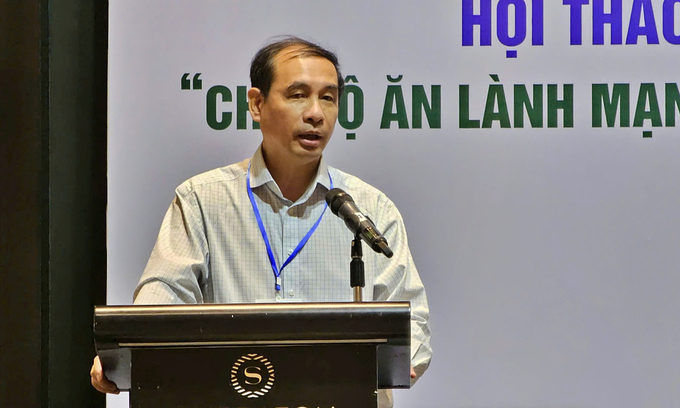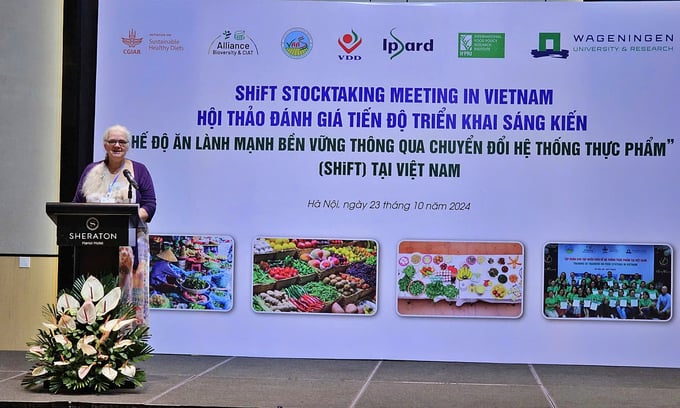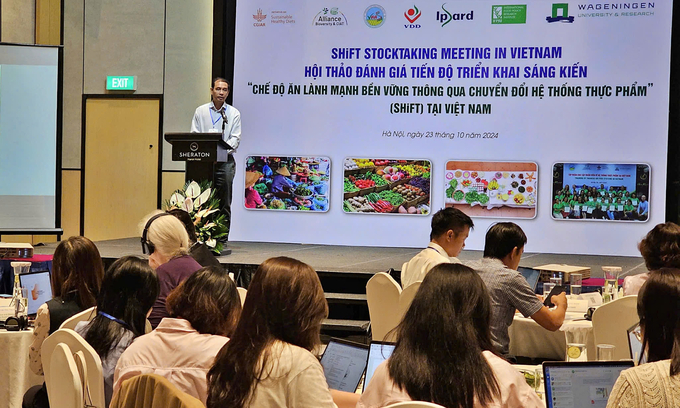November 28, 2025 | 05:38 GMT +7
November 28, 2025 | 05:38 GMT +7
Hotline: 0913.378.918
November 28, 2025 | 05:38 GMT +7
Hotline: 0913.378.918

Associate Professor Dr. Dao The Anh, Deputy Director of the Vietnam Academy of Agricultural Sciences (VAAS), shared at the workshop. Photo: Bao Thang.
In the process of rapid urbanization and uneven food environments between urban, rural, or mountainous areas, adolescents become vulnerable to negative impacts, according to Dr. Inge Brouwer, lead of the Research Initiative of the "Sustainable Healthy Diets Through Food System Transformation" (SHiFT), International Food Policy Research Institute (IFPRI).
Surveying in the northern provinces (mainly in Hanoi and Son La), her research team announced that about 23% of adolescents in rural areas are at high risk of malnutrition. In addition, adolescents in rural areas tend to eat more when the energy (calorie) ratio accounts for about 15% of the total daily intake. The corresponding figures in urban areas are 17% and 11%.
To help adolescents have enough nutrition, the IFPRI expert said promoting communication on social networks is necessary. Because this age group always spends a lot of time on the Internet. Additionally, each locality should be more proactive in providing students with strong agricultural and specialty products and fresh food.
Research on consumers and the food environment is one of the five components of the SHiFT Initiative implemented in Vietnam. In the remaining studies, scientists found that most food retailers, such as cafes, grocery stores, ready-to-eat food stalls, etc., do not face any challenges in terms of supply. In fact, a large part of them sell sustainable nutritious foods.

Dr. Inge Brouwer: 'Adolescents are among the groups most vulnerable to malnutrition'. Photo: Bao Thang.
Dr. Ricardo Hernandez, Agri-food Economist for the Alliance of Bioversity and CIAT, commented: “Most of these small, medium, and micro enterprises need to open more cold storage or develop business skills and nutritional knowledge. However, most of them do not know what kind of food is nutritious, rich in nutrients, or healthy,” he said.
Analyzing the reality of barriers in the food system in Vietnam, MSc. Pham Thi Mai Huong, the Alliance of Bioversity and CIAT, pointed out that red meat consumption is the least important issue for stakeholders in the food supply chain. Part of the reason lies in pork consumption in Vietnamese meals.
As one of the new research initiatives of the Consultative Group on International Agricultural Research (CGIAR), SHiFT will be implemented in 3 countries: Vietnam, Ethiopia, and Bangladesh in June 2022. The main goal of SHiFT is to ensure sustainable, healthy diets for all through the transformation of the food system. SHiFT focuses on consumers in the food system to increase demand for sustainable healthy diets and support micro, small and medium enterprises. Also, it supports consumers by providing them access to nutritious, safe, affordable, and sustainably produced foods.
SHiFT is currently collaborating with three strategic partners, including the National Institute of Nutrition (NIN), the Vietnam Academy of Agricultural Sciences (VAAS), and the Institute of Policy and Strategy for Agriculture and Rural Development (IPSARD).
Through the research, the partners hope to provide evidence for policymaking, develop indicators and tools, and strengthen institutional capacity to promote food system transformation. It also improves livelihoods, gender equality, and social inclusion.

The meeting attracted the participation of about 100 delegates. Photo: Bao Thang
Vu Thanh Liem, Deputy Director of the Department of International Cooperation (Ministry of Agriculture and Rural Development), acknowledged that the contributions of the SHiFT Initiative are vital in the context of limited awareness and behavior of consumers - the subject of the Vietnamese food system - regarding nutrition, green consumption, and responsible consumption.
To have the synchronous participation of all parties, on October 18, the Ministry of Agriculture and Rural Development chaired and coordinated with the Ministry of Health, the Ministry of Industry and Trade, the Ministry of Natural Resources and Environment, and 37 related partners to sign and organize the implementation of the Partnership Agreement on food system transformation. According to Liem, this will be the basis for promoting associated activities between the parties.
One week after the signing ceremony, the Workshop to review the progress of the SHiFT Initiative in Vietnam after nearly 3 years of operation focused on the support capacity of SHiFT in transforming the food system in Vietnam.
In addition to providing information on the following activities of SHiFT, Associate Professor Dr. Dao The Anh, Deputy Director of VAAS, hopes to be able to integrate information from stakeholders into the technical report of the national action plan for transforming the food system in a transparent, responsible and sustainable way.
To date, in addition to the five technical support groups, SHiFT has deployed reports and recommendations to the local level, specifically in Dong Thap and Son La provinces. By enhancing the knowledge and capacity of local stakeholders, SHiFT believes it can support the development of plans appropriate to the context of each locality, to implement the national action plan on food system transformation.
In August and September 2024, SHiFT organized two training sessions on provincial food systems in Dong Thap and Son La. In November and December, SHiFT is expected to hold technical meetings to develop an action plan for stakeholders to participate in transforming local food systems.
Translated by Huong Giang

(VAN) On November 27, in the meeting with Minister Tran Duc Thang, Mayor Yin Yong shared Beijing’s experience to improve environment and air quality.

(VAN) After 30 years, both sides identified strategic areas of cooperation: sustainable production, increasing coffee value and training for farmers.
/2025/11/27/4910-4-164708_294.jpg)
(VAN) On the afternoon of November 27 in Beijing, Minister of Agriculture and Environment Tran Duc Thang held a working session with several major Chinese enterprises operating in the agriculture and environment sector.

(VAN) The Department of Animal Health issued a provisional guideline requesting local authorities to increase surveillance, collect samples for testing, and conduct epidemiological investigations according to the established procedure.

(VAN) The United Nations recommends that Vietnam utilize data and artificial intelligence to enhance early disaster warnings and reduce GDP losses by 3.2% in the context of climate change.

(VAN) On the morning of November 27 in Beijing, Minister Tran Duc Thang and the Deputy Commissioner General of the General Administration of Customs of China signed a protocol on fresh jackfruit exports.

(VAN) As floodwaters recede, a vast network of irrigation works across eastern Gia Lai is emerging in a state of severe disrepair, with extensive damage demanding urgent restoration ahead of the 2025-2026 winter-spring cropping season.